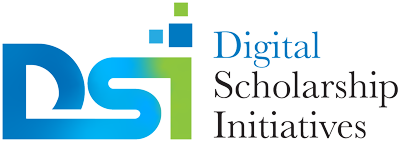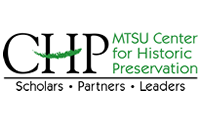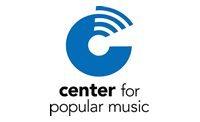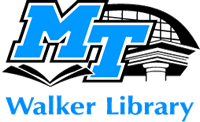What is Digital Scholarship?
Digital scholarship at Walker Library is interdisciplinary, collaborative, and committed. As a method, it emphasizes the use of interactive technologies to expand the participation, modes of access, diversity of analysis, and the dissemination, and preservation of scholarship. Digital scholarship is changing the nature of how research is conducted, produced, and shared. The frequently used term, digital humanities (DH), is a subset of digital scholarship (DS)–the larger umbrella of all scholarship including the arts, sciences, and everything between.
Specific examples include but are not limited to:
- Metadata, descriptive records that aid in the indexing and discovery of digital collections
- Data management, covers the entire lifecycle of research, including the organization of data to dissemination and archiving of data.
- Digital projects, that use digital methodologies (text mining, digitization, spatial analysis, digital preservation, extended reality, usability) and digital tools (CONTENTdm, GIS, Tableau, Voyant, Treejack, TimelineJS, Drupal, etc.) to create scholarly and creative projects.
- Open access publishing through library hosted journal software for peer-reviewed journals and open educational resources (OER)
- Institutional repository (JEWLScholar) that promotes, highlights and indexes scholarship of campus (including peer-reviewed articles, department newsletters, theses, dissertations, conference proceedings, OER, etc)
- Events that foster practical and theoretical learning and encourage interdisciplinary collaboration such as the Digital Workshop Series and the DH Seminar Series
- Opportunities for presentation or development of research in collaborative and competitive calls for proposals such as the Digital Projects Showcase and the Digital Seed Grant
- User Experience (UX) research and design methods that focus on human-centered values and design thinking methodologies such as orientation studies on interactive user experience and engagement preferences or data visualizations that inspire user-driven research
- Development of digital exhibits and thematic research collections that are collaborative in nature and often grant funded such as Trials, Triumphs, and Transformations
- Research that focuses on the qualitative and quantitative methods for evaluating the library user experience; and often published as case studies or guides on the use of digital methods and tools, such as Digital Project Preservation Plan or Collaborative Publishing in Digital History.
- Consultations and resources on digital scholarship matters, including open scholarship—(access, data, education), author rights, digitization, digital publishing, scholarly communication, digital and data tools, data management and digital project development.
Introduction to Digital Scholarship Initiatives at Walker Library
Digital Scholarship Initiatives, an extension of the mission of the Walker Library as an active partner in the scholarly communication process, supports the educational mission of the university by providing access to information. Walker Library has invested resources to establish the necessary and supportive infrastructure used in the creation and dissemination of digital resources.
Digital Scholarship Initiatives began at Walker Library several years ago as a way to build out the library’s collections digitally. More recently, library publishing and other initiatives have been added including JEWLScholar; Journal Hosting services; the creation of a collaborative Digital Partners group; and a Digital Scholarship Lab (DSL) dedicated to faculty and advanced students who enhance research by using digital tools, collaborating on digital projects, and disseminating research through digital platforms.
To learn more about the interdisciplinary goals and mission of the Digital Scholarship Lab, read our Criteria for Digital Scholarship and our Core Principles. To review some of our internal publications, such as the annual digital scholarship center assessment (referred to as Digital Scholarship Initiatives Highlights), or our institutional repository documentation (submission instructions, deposit license agreement, and author guidelines), review our Digital Scholarship Initiatives Publications.
Digital Collections and Partners
Our digital collections document diverse elements of the history of Middle Tennessee State University, Rutherford County, and the state. They have been developed by the James E. Walker Library in collaboration with a variety of partners.
On-campus partners include the Albert Gore Research Center, the Center for Cedar Glade Studies , the Center for Historic Preservation, the Center of Popular Music, and the Public History program of the Department of History.
Off-campus partners include the Arts Center of Cannon County, Rutherford County Historical Society, Rutherford County Archive, Vanderbilt University and others, including private donors of key materials.




